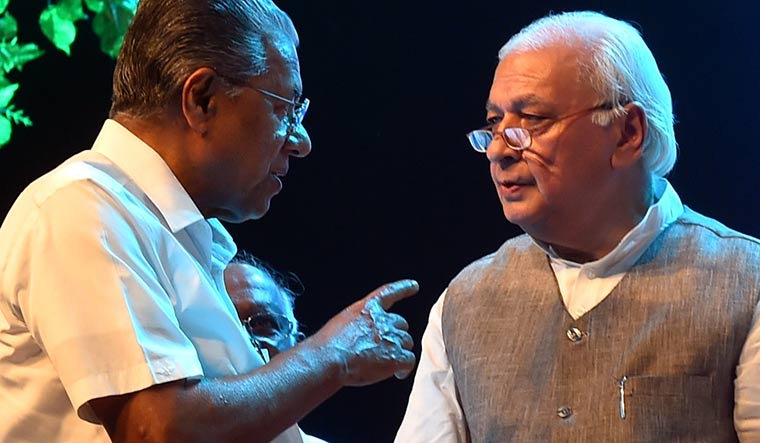In a recent article published in Deshabhimani, the mouthpiece of Kerala CPI(M), party state secretary Kodiyeri Balakrishnan raised a serious allegation against Kerala governor Arif Mohammed Khan and the Narendra Modi government. “The ruling party at the Centre and the Modi government are trying to topple the LDF government in Kerala. On one side, the central agencies like the Enforcement Directorate are being used for this while on the other side, the governor is being used to trouble the government,” he wrote.
On August 12, while addressing the media after the party state committee meeting in Thiruvananthapuram also Balakrishnan made similar comments. Since Khan became the governor of Kerala, there have been multiple episodes of tussles between the governor's office and the state cabinet. The latest episode of the tussle started fuming when the state government initiated its move to bring in a special ordinance to limit the governor’s powers as chancellor in the appointment of vice-chancellors in the state universities.
The governor reacted to the government's move by not signing 11 ordinances, including a controversial Lokayukta Amendment ordinance, citing that ordinance raj is “not desirable in a democracy”; all those ordinances expired on August 9. It was in this context that Balakrishnan commented on the governor’s intent. Interestingly, he cited that it was the governor who had worked “against the democratic principles” via his “his unprecedented interventions”.
On August 16, the Kerala cabinet approved the bill to curtail the governor’s powers and functions as chancellor. Khan slammed it saying “no bill can become a law without the governor signing it”. While talking to a channel, he also made an allegation that the government’s move proved that it has certain things to hide.
On August 17, the governor took his shot when he invoked his powers as the chancellor of Kannur university to stay the appointment of Priya Varghese—wife of K.K. Rajesh, a former MP and the current private secretary of Chief Minister Pinarayi Vijayan—citing nepotism. Khan took the stance that the stay was made after he had found some merit in nepotism allegations against Varghese’s appointment as an associate professor.
The allegations were raised by the Save University Campaign Committee—an organisation that had its beginning in University College Thiruvananthapuram in 2019 after a student attempted suicide on the campus allegedly because of the harassment from CPI(M)’s student-wing activists.
As this tussle continues, questions about the governor’s role and functions once again come to the forefront. The governor's role as chancellor of state universities is something that Indian states inherited from the colonial era. The Indian Constitution does not have a provision which says that the governor should be made chancellor of universities; it is a statutory position that is not envisaged by the Constitution. The report submitted by Justice Madan Mohan Punchhi commission—which studied the issues of Centre-state relations—on March 30, 2010, made some interesting recommendations on the governor’s role as chancellor of state public universities. “To be able to discharge the Constitutional obligations fairly and impartially, the Governor should not be burdened with positions and powers which are not envisaged by the Constitution and which may expose the office to controversies or public criticism. Conferring statutory powers to the Governor by the State legislature has that potential and should be avoided. Making the Governor the Chancellor of the Universities and thereby conferring powers on him which may have had some relevance historically has ceased to be so with a change of times and circumstances. The Council of Ministers will naturally be interested in regulating University education and there is no need to perpetuate a situation where there would be a clash of functions and powers,” it says. The commission also made the recommendation that Governor should not be assigned functions “casually under any Statute” and that his role should be “confined to the Constitutional provisions only”.
In the last one-year, multiple states—all ruled by non-BJP parties—have moved in the direction of curbing the powers of governors in state public universities. In December 2021, the Maha Vikas Aghadi government of Uddhav Thackeray passed Maharashtra Public University Act, 2016 (Third Amendment) Bill to give more power to the higher and technical education minister. Under the original act, the Maharashtra government had no say in the appointment of Vcs.
The BJP came strongly against it saying that the bill is intended to undermine the governor’s power. The bill did not get the necessary assent from the governor, and it resulted in a delay in the formation of search committees for appointing vice-chancellors in multiple universities. In June, the MVA government fall. The new Maharashtra government under Eknath Shinde is expected to revoke the bill, as the BJP is a coalition partner in the new government.
In Tamil Nadu, the government passed multiple bills to limit the governor's powers as chancellor and transfer the power of appointing the vice-chancellors in different universities from the governor to the state government. The bills have not got the final assent from governor R.N. Ravi, yet. In West Bengal, too, a similar move happened when the legislative assembly passed a bill—West Bengal University Laws (Amendment) Bill—on June 13 to make Chief Minister Mamata Banerjee the chancellor of all state universities, replacing the governor from the traditional position. This bill is also now pending with the governor’s office.





